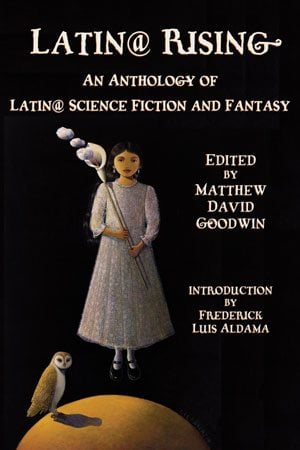Wonderful write-up in the Texas Observer of an all-Latino, Sci-Fi anthology. It's incredible that in 2017, this is the first ever which is not only sad, but revealing of a deeply systemic problem with respect to books by Latin@s within this genre.
Yes, such things are always a testament to the outstanding work of the editor and contributing authors, but deeper, larger historical structures and systems of power are also at play.
Yes, such things are always a testament to the outstanding work of the editor and contributing authors, but deeper, larger historical structures and systems of power are also at play.
Happy to see this volume out, nevertheless. Looks like it could provide some much-needed comic relief for times like these.
Angela
Angela
In the Age of Trump, the First All-Latino Sci-Fi Anthology Hits too Close to Home
Sci-fi has a long tradition of talking about power, dystopian politics and authoritarianism — and it’s never been more necessary.

Edited by Matthew David Goodwin
WINGS PRESS
$16.95; 272 pages
A little blue-gray house in San Antonio’s King William neighborhood is home to one of the book world’s best-kept secrets: Wings Press, an indie publisher known for amplifying the voices of Latino and Chicano authors. With an impressive catalog that includes such luminaries as Rosemary Catacalos, Rick Bass, Wang Ping and the Observer’s own Naomi Shihab Nye, the press has been spreading its multicultural message for more than 40 years.
Now Wings has made history by publishing the first-ever anthology of science fiction and fantasy by Latinos in America, Latin@ Rising. The 24 stories and poems in this nuanced and timely collection all seek to foreground brown voices. From 1984 to Dune, sci-fi has a long tradition of talking about power, dystopian politics and authoritarianism with a freedom that literary fiction can’t touch — and as we enter the age of Trump, it’s never been more necessary.
Outside of the inclusiveness of the original Star Trek or X-Men’s fantasies of mutant acceptance, science fiction hasn’t always been the most inviting for authors of color — a legacy that Frederick Luis Aldama criticizes in his introduction. Aldama, an expert on Latino literature and pop culture, charges the genre with too often employing the mythos of manifest destiny and relying upon a “white savior,” a tendency obvious in a film like Avatar. From space opera to cyberpunk, the genre has never had a problem espousing Ubermensch ideals or pushing eugenics as go-to plot points. Fantasy fiction, with its white wizard drama that runs from Tolkien to Tanith Lee, fares no better.
Roberto Ontiveros is an artist, critic and fiction writer; his work has appeared in the San Francisco Chronicle, the Threepenny Review, the Dallas Morning News, and others.
No comments:
Post a Comment